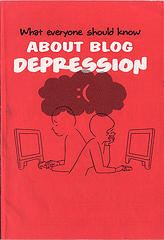 The American Academy of Pediatrics has just released a very interesting report. It addresses Facebook use by kids and has some warnings to impart.
The American Academy of Pediatrics has just released a very interesting report. It addresses Facebook use by kids and has some warnings to impart.
Unsurprisingly, among the main topics are social ostracism and online bullying. [See my earlier writing on the subject on this blog.] Another one that seems to be catching on in the press is the so-called “Facebook Depression.” Serena Gordon, HealthDay reporter for BusinessWeek, says:
Another potential risk of social media has been dubbed ‘Facebook depression.’ When preteens and teens spend too much time on social media sites, they may begin to show classic signs of depression, such as changing sleep and eating habits, experiencing mood swings, hanging out with different friends or becoming socially isolated, according to [report author and CEO and editor-in-chief of Pediatrics Now Dr. Gwenn] O’Keeffe.
O’Keeffe said that while parents need to have open discussions with their children and teens about their online media use, parents probably don’t need to be ‘hypervigilant’ about computer use. ‘We don’t keep an eye on our children all the time in real life. At some point, we have to take a certain comfort in the way that we’ve raised them, and have that confidence that they’ll make appropriate choices,’ she said.
Interaction is something that many teens find hard, this was true even before the advent of social media. I know it was true all too long ago, when I was a teen. The exploding array of social options merely amplifies it.
With increased opportunity for interaction comes increased opportunity for rejection. While some kids can find supportive groups (children with cancer using social media to interact with others who share their plight is one example), others do not.
The report also shares ways to attempt to combat Facebook Depression and find a safe path through the many twisting paths of social media. Here’s a quick summation via Catharine Paddock, Ph.D., for Medical News Today. Note that one of the things most highly advised is to involve your pediatrician:
They suggest pediatricians are in a unique position to help children and their parents and families understand why it is important to look out for potential problems such as exposure to inappropriate content, cyberbullying, ‘Facebook depression,’ and sexting (sending sexually explicit messages or images, mostly by cellphone).
The report recommends that doctors speak to families and advise parents to:
- Talk to their children and teenagers about use of the Internet, and the issues that face kids online today.
- Talk specifically about cyberbullying, sexting and the pressure that social media use can put on managing time.
- Consider the need for a ‘family online-use plan’ that stresses citizenship and healthy behavior.
- Be aware of the need to supervise their children’s online activity, and to do this actively, by participating and discussing it with them, and not just by using monitoring software.
When I was a kid, I could find an amazing array of distractions to keep me from my homework, especially if other kids were involved. It must be so much harder now that interaction is a keystroke away. The ease and ubiquity of platforms like Facebook make them tempting to say the least.
That’s where communication with your child becomes vital. You cannot make accurate decisions about his or her use of social media if you are not aware of the child’s usage habits to begin with.
If you have a waterfront property in the Sarasota or Venice, FL, area that you want to enjoy to the fullest, then you need a sturdy dock to make sure your boat stays in great shape and that your time on the water is enjoyable. That’s why I recommend dock builders sarasota fl.
Source: “Doctors say teenagers can suffer from ‘Facebook depression’,” ABC Action News YouTube Channel, 03/28/11
Source: “Social Media Has Good and Bad Effects on Kids: Experts,” BusinessWeek, 03/28/11
Source:”Social Media Has Benefits And Risks For Kids,” Medical News Today, 03/28/11
Image by rebba’s (Rebeca Aldama Garcia), used under its Creative Commons license.